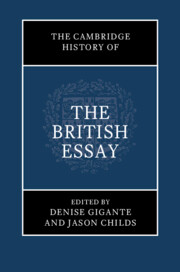Book contents
- The Cambridge History of the British Essay
- The Cambridge History of the British Essay
- Copyright page
- Contents
- Illustrations
- Contributors
- Acknowledgements
- Preface to a History in the Manner of an Essay
- Part I Forming the British Essay
- Part II The Great Age of the British Essay
- Part III Assaying Culture, Education, Reform
- Part IV Fractured Selves, Fragmented Worlds
- 29 The Preface Essay
- 30 A Brief History of Travel and the Essay
- 31 Grist for the Mill: History and the Essay in India, 1870–1920
- 32 The African Gold Coast Essay: Straddling Fact and Prophecy
- 33 The Short Essay in Context, 1870–1920
- 34 A Room of One’s Own: The New Woman and the Essay
- 35 The Essay in the Age of Catastrophe
- 36 Undiplomatic Relations: Modernism and the Essay
- 37 Feeling Real: Psychoanalysis and the Essay
- 38 Transatlantic Essayism
- Part V The Essay and the Essayistic Today
- Book part
- Bibliography
- Index
35 - The Essay in the Age of Catastrophe
from Part IV - Fractured Selves, Fragmented Worlds
Published online by Cambridge University Press: 31 October 2024
- The Cambridge History of the British Essay
- The Cambridge History of the British Essay
- Copyright page
- Contents
- Illustrations
- Contributors
- Acknowledgements
- Preface to a History in the Manner of an Essay
- Part I Forming the British Essay
- Part II The Great Age of the British Essay
- Part III Assaying Culture, Education, Reform
- Part IV Fractured Selves, Fragmented Worlds
- 29 The Preface Essay
- 30 A Brief History of Travel and the Essay
- 31 Grist for the Mill: History and the Essay in India, 1870–1920
- 32 The African Gold Coast Essay: Straddling Fact and Prophecy
- 33 The Short Essay in Context, 1870–1920
- 34 A Room of One’s Own: The New Woman and the Essay
- 35 The Essay in the Age of Catastrophe
- 36 Undiplomatic Relations: Modernism and the Essay
- 37 Feeling Real: Psychoanalysis and the Essay
- 38 Transatlantic Essayism
- Part V The Essay and the Essayistic Today
- Book part
- Bibliography
- Index
Summary
Essays of the ‘age of catastrophe’ encompassing the two World Wars have been judged aesthetic failures because, in their argumentative force and dogmatism, they break with a fundamental commitment of the essayistic: to provide an open, even democratic relational space between reader and writer. This has hindered our ability to recognise them as important objects of historic memory. Assuming that the rhetorical power of the essay may just as often be used to defend truth and justice as to agitate for and justify violent conflict, this chapter will examine the essayistic mode of political essays by Rudyard Kipling and Vernon Lee. It will argue that political essays often display the same longing for connection and attachment that has long been deemed the cornerstone of the literary essay.
Keywords
- Type
- Chapter
- Information
- The Cambridge History of the British Essay , pp. 526 - 539Publisher: Cambridge University PressPrint publication year: 2024

